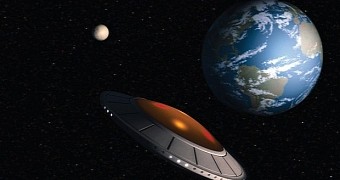Earlier this week, market research firm YouGov published a survey revealing that 54% of Americans, 56% of Germans, and 52% of British people believe in aliens.
Since the survey only focused on these three cultures, it can’t be considered representative of the globe’s entire population. Otherwise put, these figures don’t mean that more than half the people in the world believe in aliens.
Be that as it may, 54% of Americans, 56% of Germans, and 52% of British people still make for a whole lot of alien believers. Hundreds of millions of them.
Are all these people complete nutcases?
To the best of our knowledge, the universe is infinite. We’ve been probing it for years now, and our most sophisticated telescopes and most brilliant minds are yet to find any margins to it.
In the observable universe, which is the universe we can study from here on Earth because light and other signals have had time to reach us since after the Big Bang, scientists have counted around 100 billion galaxies, each populated by armies of stars.
Our Milky Way, which isn’t even all that big when compared to other galaxies, is estimated to hold about 100 to 400 billion stars. The biggest of galaxies, however, are home to trillions of stars.
Then, astronomers estimate there are about 100 billion planets in the Milky Way alone. Mind you, they think there are as many as 1,500 planets within just 50 light-years of our Earth.
Plainly put, there are hundreds of billions - if not trillions - of planets out there. If Earth is the only one on which life has emerged and thrived, well, this would make us and our existence a colossal fluke. It’s kind of scary when you think about it, isn’t it?
These figures explain why conspiracy theorists aren’t alone in thinking extraterrestrial beings are lurking somewhere in the deep cosmos, or maybe even closer to us than we’d like them to. Au contraire, this opinion is shared by many scientists.
But let’s not get ahead of ourselves just yet
What’s interesting about this quest of ours for extraterrestrial beings is that, as sure of their existence as many of us are and as determined to find them as we might be, the fact of the matter is researchers haven’t yet reached a consensus on what makes a living organism.
Our thoughts on the matter are heavily reliant on what we have so far learned about life here on our planet. Carbon chemistry and liquid water are characteristics common to life on Earth, but they might not be a feature of extraterrestrial creatures.
So, while the origins of life on Earth come down to a build-up of simple carbon-containing organic molecules that in time formed more complex molecules and then rudimentary genes and bacteria-like cells, extraterrestrial life might have started out very differently.
Besides, it’s important to note that, while many like to think of aliens as advanced civilizations, this isn’t necessarily the case. Biologists say that, to be considered a form of life, an entity need only be able to replicate itself and, in time, evolve. Pretty basic, right?
So, when scientists say they’re looking for aliens, they don’t mean they’re searching for weird, green creatures flying around in state-of-the-art spaceships. Even a bacterium, no matter how teeny tiny and simple, would still be worthy of being called an alien, just as long as we find it on another planet.
Now, it might be that alien civilizations with technologies similar to our own but much more advanced are a bit of a stretch, but given the vastness of the cosmos, assuming that at least microbial life has evolved on one of the many orbs that populate the universe makes perfect sense.

 14 DAY TRIAL //
14 DAY TRIAL //